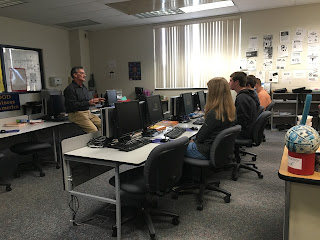National FFA Week
This week, we had a dress up day for each day of the week. We also attended Meet Your State Officer at Hoss's night. It was nice to chat with some neighboring ag teachers and eat some good food!
 |
| Meet Your State Officer at Hoss's Night |
We also had a teacher appreciation breakfast on Friday morning before classes started. The FFA students stayed after school on Thursday and came in early Friday morning to help with the preparations for the breakfast. This teacher appreciation breakfast also brings in some people from the community so it was nice meeting some other community members. I got to talk to one woman who was one of the first female agriculture teachers in Pennsylvania. She shared with me her story and the struggles she had to face. Others who joined us gave me some great advice or otherwise were a joy to talk to.
PA One Stop Erosion and Soil Conservation Management Planning
 |
| Students being trained on the program |
My community based unit of instruction project was working in conjunction with Penn State to train students to use the PA One Stop program. The students would then work with local farmers on using the program and creating a conservation plan for their farms. On Wednesday, the students were trained and then the farmers came in. They were each able to help out a farmer and give support and assistance when needed. It was a neat experience and I think the students benefited from it by not only providing a service, but by knowing how to use the program to manage their own family's farm.
 |
| Farmers joining us for the training |
Reflection on my classes
 |
| Testing pH of foods in Food Science |
Other than that, this week, classes have been going on as usual (not that there is really a normal day). The students in my plant science class had their first exam. Some of them scored really well and others didn't score as nicely as I would have hoped. I wish we had longer to review the day prior, and I wish I had told them sooner about the study guides that were posted in their online course management system (we use Schoology). But I think the students also needed to put in some extra effort outside of class time to study. What I've gathered from many of them, they didn't really study even though they knew well ahead of time that this week was the exam. I can't help feeling like there might have been something more I could have done to help them, but again, I think part of it was a motivation on their part to put in extra work.
 |
| Making jam in the canning lab |
In my agriscience class, the Life Skills students I had previously worked with are now in the classroom with me and the rest of their peers. When it was just me and the Life Skills students, I felt I could fill their needs, but now that there is a wide range of learning abilities, I am finding it really challenging to meet the needs of the Life Skills students as well as the strong academic students. Especially since the unit I'm on is public speaking and there really isn't a way to make that hands-on other than having them present speeches (which most are naturally scared to do).
 |
| Having Animal Bioscience outside! |
Plans for next week
In plant science, we will be starting the next unit on hydroponics and alternative plant uses.
In small engines, we will be using micrometers and learning how to measure with them.
In agriscience, we will continue talking about how to write and structure speeches.
In welding, we are going to start discussing techniques for how to weld.
In animal bioscience, students are going to finish learning about dairy cattle production and are going to begin learning the anatomy of an udder.
In food science, students are going to learn about food dehydration and some other methods of preservation.
In leadership, students are going to continue writing their speeches and will be given time to write their speeches.
Leaving Thought
"Even though I walk through the valley of the shadow of death, I fear no evil, for You are with me; Your rod and Your staff, they comfort me." -- Psalms 23:4































